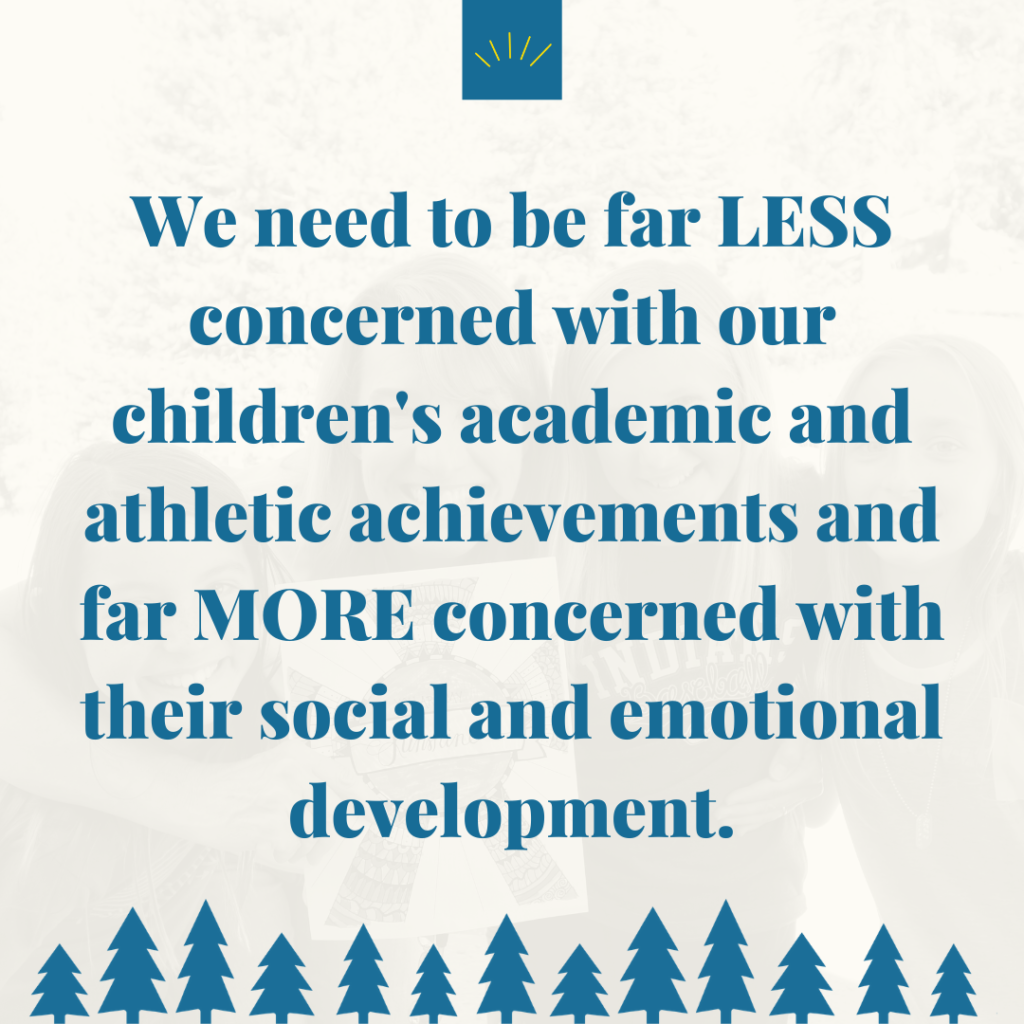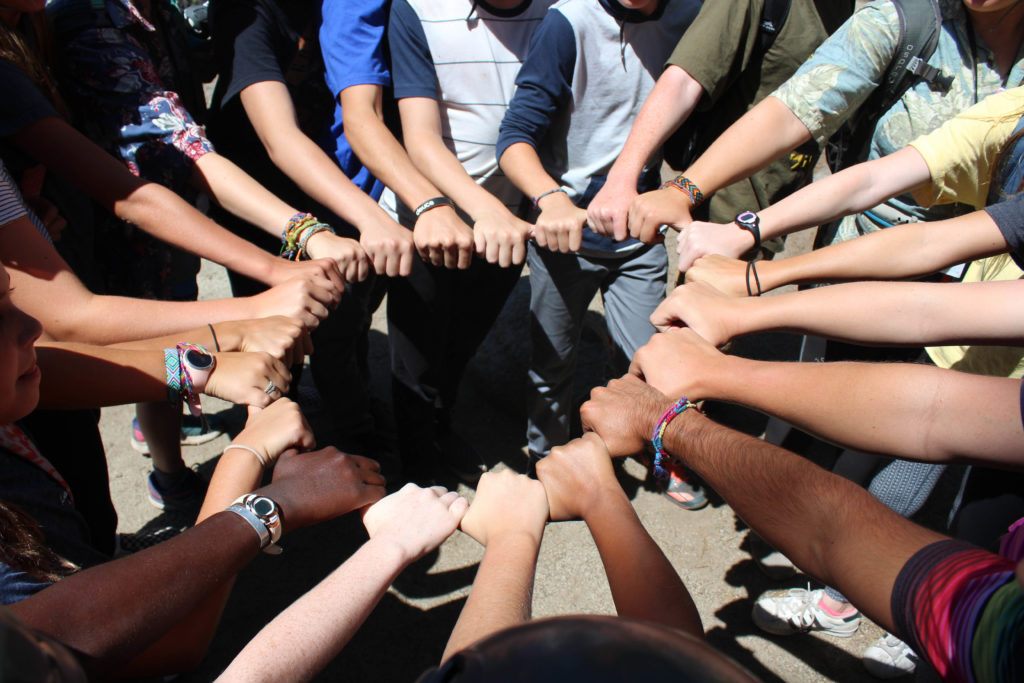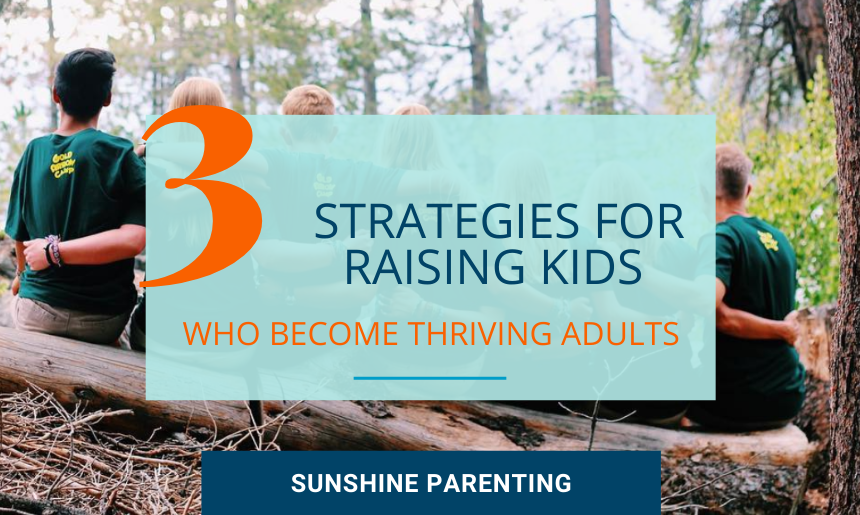What do you want for your child in 10 years?
20 years?
What dreams do you have for him/her?
These are the questions I often ask parents to reflect upon before I begin talking with them about positive parenting strategies or children’s friendships.
I’ve also started clearly articulating the main idea behind the work I do with parents and others who work with and care about children:

We need to be far LESS concerned with our children’s academic and athletic achievements and far MORE concerned with their social and emotional development.
Why is this the case?
Because the ability to manage personal feelings and understand the needs and feelings of others is the foundation for positive interactions, which manifest in every area of a child’s life: health, longevity, happiness, and even academic and career success.
Focusing more on social/emotional health is not a trade-off. Simply put, better emotional intelligence and interpersonal skills lead to a better life.
So rather than getting caught up in the cultural trends towards high stakes competition and college prep mania, if we take the long view on raising our kids (remembering the outcome we want 10 or 20 years down the road), we will help them thrive as children, adolescents, and as adults.
Parenting kids has never been more challenging. We are raising kids with negative cultural influences unlike any we have seen before: ubiquitous screens, high stakes academic stress, and overly competitive, time-consuming athletics.
Things have gone a little (or a lot) crazy! Your child – regardless of all that you do at home – will be exposed to ideas and influences that DO NOT promote social-emotional health. Our modern American culture – with more opportunities and pressures than ever before – has resulted in an epidemic of loneliness, depression, anxiety, and suicide in our teens.
But there are simple things you can do to provide some protection for your kids from these negative influences. You have a powerful role in promoting your child’s social and emotional health.
Here are three parenting strategies that can make a huge difference in putting your child on the path to thriving socially and emotionally.

#1 FOCUS ON YOUR CONNECTION/RELATIONSHIP WITH YOUR CHILD FIRST
“Connection is why we’re here.” Brene Brown
You are your child’s parent, and the most important thing they need from you is to feel loved, cherished, and accepted regardless of what they accomplish, what they look like, what they are interested in, and how they are different.
Be their greatest supporter and the person with whom they want to share victories and defeats. Celebrate with them and provide a loving, supportive shoulder to cry on when they face the inevitable mistakes, failures, and setbacks that are part of life.
Your child will have many adults in their life who are not their parent – teachers, coaches, advisors. Those people will – for the most part – not put their relationship with your child as their top priority. They will focus on drills and achievements and measurable stats.
Give your child one safe place where they know they are loved regardless of whether they scored a goal or got an “A.” Let that safe place be you.

How can you build a close connection with your child?
- Be together, doing fun things, as much as possible. Find at least one hobby you enjoy doing together, and make it a regular activity. It can be anything: reading, crafts, playing cards, backgammon, chess (or another game), hikes, bike rides, surfing, playing Frisbee, or fishing. The most important thing is that you both enjoy doing the activity and will continue to do it together regularly – even (especially!) during their adolescent years.
- Make “hygge”–the Danish concept of cherishing moments–part of your family habits. Set aside a weekly time where you just cozy up together, unplugged. You can do this by the fire, and outdoor campfire, or with a few candles. This can include a family game you play, a book you’re reading together, or just a weekly family chat to catch up on what’s going on with everyone.
- One-on-Ones: Make sure that every day, without fail, you take just a few minutes to give your child your undivided attention and listen to them talking about their day, a story they want to tell you, or anything at all.
- Unplug: Turn your phone off or put it away, and listen intently to your toddler’s elaborate story. They will learn that you are available and interested and will tell you bigger stuff later.
If your kids are older and immersed in their devices, have designated family unplugged times every day and at least one longer period every week. Our kids are learning from us how to manage their devices and focus on real relationships. They are NOT getting good examples from their peers and the rest of the world. They will get their best example from you.

#2 PROMOTE SOCIAL & EMOTIONAL GROWTH
Unlike academics and athletics, which can be easily assessed with grades or stats, social and emotional growth needs to be viewed instead as a group of skills our children need to develop over their childhood and adolescence. We see glimpses of the skills our kids already have or still need to develop through their behavior.
What are some of the social and emotional skills kids need to develop?
- Emotional self-regulation skills (able to identify feelings, calm down, not “flip their lid”)
- Understanding others’ feelings and needs
- How to interact positively with others
- Ability to delay gratification
- Be able to deal with setbacks, disappointments, failures (resilience)
What can parents do?
- Get comfortable with their (and your own) discomfort. Let them handle their own mistakes, failures, and social snafus.
- Learn a good, empathetic response, “Oh, that sounds really hard…”
- Empathize, ask questions – “What are you thinking about doing?” Express confidence in their ability to handle the situation.
- Think of yourself as a “friendship coach,” encouraging them where they have social strengths, providing gentle coaching in areas where they have deficits.
- Share your own feelings, “I was frustrated when…” “I was really disappointed when…”
#3 MODEL THRIVING (focus on your OWN well-being)
- Focus on people and face-to-face connections – People are a great use of time. Take time on your own friendships outside of work/family.
- Say “no” to over-scheduled, crazy family life and yes to connection with your family, friends, neighbors. Match your own and your family’s schedule to your values. Make sure you have congruence. If you LOVE sports, then spending 15 hours of your family time a week on sports might be okay. But what if you value reading or hiking or volunteering and haven’t set aside any time for those activities?
- Find your own FLOW – Show your child what a thriving adult human does – spend time on your activities/hobbies/interests (even if that means hiring a babysitter, trading babysitting with a friend, or taking a weekly craft or reading night and letting your spouse be with the kids).
- Take care of yourself– If kids see moms and dads as frazzled, overworked, and unhappy, what motivation is there to grow up and get a job? Might they just consider it depressing and anxiety-inducing to go to college/get a job/ become an adult? Why not just stay in the basement playing Xbox?
It’s a complicated, anxious world our kids are growing up in, but these parenting strategies can help us guide them through childhood and adolescence and into a thriving adulthood.
Want more tips? Check out my book, Happy Campers: 9 Summer Camp Secrets for Raising Kids Who Become Thriving Adults.


